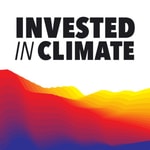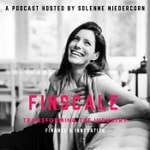Invested In Climate – Détails, épisodes et analyse
Détails du podcast
Informations techniques et générales issues du flux RSS du podcast.

Invested In Climate
Jason Rissman
Fréquence : 1 épisode/10j. Total Éps: 116

Classements récents
Dernières positions dans les classements Apple Podcasts et Spotify.
Apple Podcasts
🇫🇷 France - investing
30/05/2025#89
Spotify
Aucun classement récent disponible
Liens partagés entre épisodes et podcasts
Liens présents dans les descriptions d'épisodes et autres podcasts les utilisant également.
See all- https://www.podcastfasttrack.com
449 partages
- https://www.podcastfasttrack.com/
320 partages
- https://www.bloomberg.com/green
294 partages
- https://www.linkedin.com/
524 partages
- https://www.linkedin.com/in/jasonrissman/
89 partages
- https://www.linkedin.com/in/sethgodin/
45 partages
- https://twitter.com/jasonrissman
82 partages
- http://twitter.com/investedclimate
31 partages
- https://twitter.com/christianhern
3 partages
Qualité et score du flux RSS
Évaluation technique de la qualité et de la structure du flux RSS.
See allScore global : 79%
Historique des publications
Répartition mensuelle des publications d'épisodes au fil des années.
The Role of Family Offices with Spring Lane & CREO, Ep #114
Épisode 114
mercredi 28 mai 2025 • Durée 44:19
The climate transition requires not just allocating trillions of dollars to scale new technologies, build new infrastructure, and transform incumbent industries – it requires getting the right mix of capital to develop, grow, and eventually scale innovations.
In the world of climate, promising technologies too often don’t find the growth-stage capital that’s needed before large institutional investors can finance reaching scale. Addressing this missing middle is a structural challenge that requires more attention, and today’s episode is the first in a series of discussions on the missing middle in climate, developed in partnership with Spring Lane Capital.
In this conversation, I’m joined by Jason Scott, a long-time climate investor who is Partner in Residence at Spring Lane Capital and also Board Chair of CREO Syndicate, and Régine Clément, CEO at CREO Syndicate. Spring Lane has been investing for years in the missing middle and has unique expertise in the challenges and opportunities it holds. If you haven’t heard of CREO, this is a group you should know. CREO works to help family offices invest more in climate. Families hold over $10 trillion in assets and can bring versatility and resilience that can help improve climate finance. CREO is working to mobilize $1 trillion for climate in the coming years. We talk about insights from their recent report on the missing middle, how climate investing has evolved in recent years, the role of catalytic capital, whether investors are backing away from climate amidst changing policy and macro-factors, and much more.
This was a great kick-off for our Deep Dive: Missing Middle in Climate Tech series, and I hope it piques your interest in the other episodes as well. And, if it piques your interest about partnering on a topical series of your own, don’t hesitate to reach out.
What You'll Learn
- What the "missing middle" is and why it's crucial for climate progress
- How climate financing has evolved over the past decade and what gaps remain
- The unique role family offices play in addressing climate investment gaps
- Why growth-stage capital is especially scarce despite strong returns in climate investing
- How policy uncertainty and structural market issues impact climate finance
- Strategic approaches to mobilize trillions for climate solutions by 2030
In today’s episode, we cover:
- 03:12 - Régine’s background and CREO Syndicate's work
- 06:08 - Jason’s background and Spring Lane Capital’s work
- 08:22 - Defining the "missing middle" in climate finance
- 13:19 - Analysis of climate investment trends and current market dynamics
- 17:43 - The 6x financing gap needed to reach climate goals by 2030
- 19:57 - Why the missing middle in climate is more complex than in other sectors
- 24:49 - Structural challenges with fund sizes and misaligned investor incentives
- 30:33 - The surprising finding that only 18% of self-proclaimed climate funds invest >50% in climate
- 34:05 - Perspective on progress despite policy uncertainty and market fluctuations
- 37:47 - The economic case for climate investing beyond environmental benefits
- 41:27 - The unique role of family offices in catalyzing climate capital
Resources Mentioned
Removing Carbon Market Bottlenecks with Sylvera, Ep #113
Épisode 113
mardi 13 mai 2025 • Durée 34:01
The voluntary carbon markets have been a source of curiosity for me. There’s been a lot of hope that the market would mature and offer a reliable way to offset emissions that otherwise could not be eliminated. Reliability has been the problem, however. Not knowing which carbon reduction projects are additive and truly remove or reduce carbon has held this market back, and I’ve been excited to learn about how new technologies will enable the reliability that’s needed.
There are many people working on this problem. Dr. Allister Furey, Founder and CEO of Sylvera is one, and I was excited to learn about his company’s approach to removing carbon market bottlenecks and accelerating the investment in carbon projects. As he says it’s a mix of software, data, AI, and analysis that have helped Sylvera work with large clients and unlock enormous investments. Hope you learn as much as I did. Enjoy.
On today’s episode, we cover:- [03:37] Allister’s background and entrepreneurial journey
- [05:54] Sylvera's founding and initial business concept
- [10:42] Exploration of the desert greening concept
- [11:27] Sylvera's current business offerings
- [17:10] Sylvera’s progress, reach, and client base
- [20:24] Corporate climate commitment trends
- [22:44] Corporate demand for carbon projects
- [26:12] Policy market expectations
- [29:07] Climate investor sentiment
- [30:33] Future outlook for carbon markets
Resources Mentioned
Connect on LinkedIn
Keep up with Invested In Climate
- Sign up for our Newsletter
- Bluesky
Have feedback or ideas for future episodes, events, or partnerships?
Climate Tech Predictions with Obvious Ventures' Andrew Beebe, Ep #104
Épisode 104
mardi 28 janvier 2025 • Durée 41:18
What 2025 will bring for climate tech is pretty hard to predict. We’ve seen a slowdown in investments at the same time as we see a continued flood of talent into the space, maturing technologies, and a boom in AI that could be transformative for climate solutions. The new administration? Nobody really knows how they’ll orient around climate tech, or how private investors will respond.
There’s a lot of uncertainty, but of course, pros who have been in this game for decades and who study early-stage climate technology closely have some ideas of where we’re headed. So I was thrilled to get to catch up with Andrew Beebe, Managing Director of Obvious Ventures. We spoke about Andrew’s background as an entrepreneur and the parallels he sees between the Internet's and climate tech's early days. We talked about where climate tech is today, 5 predictions he has for 2025, generative science, technologies he’s most excited about, what needs to change to address the climate crisis, and more. Andrew brings the nuance and clarity of someone who’s been working closely with energy and climate entrepreneurs every day for a long time. We didn’t solve all the mysteries of what this year will bring, but I think Andrew shared some great food for thought and real opportunities.
Resources MentionedConnect with Andrew Beebe
- Connect with Andrew on LinkedIn
Connect with Jason Rissman
Keep up with Invested In Climate
- Sign up for our Newsletter
Have feedback or ideas for future episodes, events, or partnerships?
Magically appearing electric vehicles with Halo.car, Ep #15
Épisode 15
mardi 9 août 2022 • Durée 48:39
To address climate change, there's little doubt that we need to replace gas powered cars with electric vehicles. But is owning an EV actually needed? What if rather than buying a car that remains parked most of the time, electric vehicles could just appear when we need them. That's the bold vision of Anand Nandakumar, Founder of the startup Halo.car. The company provides a solution enabled by technology and a team of remote pilots that offers the convenience of Lyft or Uber, combined with the freedom of Zipcar. I had a blast talking to Anand and think you will enjoy his big thinking and great insights to transportation, cities, urban design, the future and more. So buckle up. Here we go.
In Today’s Episode, we cover:- [2:45] What is Halo.car and what problem is it aiming to solve
- [6:36] Anand’s story and what led him to start Halo.car
- [10:30] The innovation behind what makes Halo.car special
- [12:48] Overcoming the technical and regulatory challenges of a new market
- [18:44] The process for selecting and training remote pilots
- [21:29] Halo.car’s launch in Las Vegas and growth plans
- [28:16] The global market opportunity and insights into opportunities in India
- [30:38] A vision for the future of mobility and urban design
- [36:44] Looking forward towards autonomous vehicles
- [43:09] Being a climate entrepreneur in this current moment
- [47:07] Practicing minimalism for climate impact
Resources Mentioned
Connect with Anand Nandakumar
- Connect with Anand
Connect With Jason Rissman
Subscribe to Invested In Climate
Non-dilutive climate investing with Enduring Planet, Ep #14
Épisode 14
lundi 1 août 2022 • Durée 48:19
The thing that's most exciting for us working in climate is that we are witnessing one of the largest societal transformations that we'll probably ever see. And we're right at the start of it.
Over the next decade, we're going to see an explosion of growth and opportunity in this space. Last year, over $40 billion in venture capital went to over 900 climate tech companies. To put that in context, that's double what it was just the year before. And yet, this is just a fraction of climate entrepreneurship. In addition to these hundreds of venture backed startups, there's hundreds of thousands, maybe even millions of small businesses, turning their sights to climate impact. Most are not a fit for or interested in venture capital, but they still have financing needs.
This is the market that Dimitry Gershenson and Erin Davis are serving with their startup, Enduring Planet. They offer non-dilutive funding on founder-friendly terms. While there's a ton of coverage of the venture capital market, Dimitry and Erin bring unique perspectives to the incredibly diverse and expansive field of climate entrepreneurship. Full disclosure: I'm a big fan of Enduring Planet and recently made a small investment in their seed round. I think you'll see why I'm so excited by their potential. Here we go.
In Today’s Episode, we cover:- [4:30] What is Enduring Planet and what problem is it aiming to solve
- [6:02] The type of companies that Enduring Planet is looking to invest in
- [8:05] What it means to be founder-friendly and the experience founders can expect
- [10:36] What is non-dilutive funding and why might it be the best option
- [11:08] The market size and exciting areas for non-dilutive climate investments
- [15:06] How many companies Enduring Planet is looking at and the current reach
- [19:24] Serving underrepresented founders through corporate DNA
- [24:12] The breadth of companies emerging and the generational shift
- [27:37] Fixed income intermediaries as a missing piece of the climate innovation puzzle
- [31:18] What is revenue-based financing, how it works, and why it’s the first product
- [35:26] What revenue-based financing means for business and viability
- [39:04] Using technology to improve the process of evaluating investment opportunities
- [41:09] Enduring Planet’s growth goals for the next 3-5 years
- [44:30] Advice for individual investors interested in climate
Resources Mentioned
Connect with Dimitry Gershenson and Erin Davis
Connect With Jason Rissman
Subscribe to Invested In Climate
Climate tech insights from Latin America, Ep# 13
Épisode 13
lundi 25 juillet 2022 • Durée 42:05
Bienvenidos and welcome. Latin America is one of my favorite places in the world to visit and so I was thrilled to get to learn about the state of climate tech investing in Latin America for this episode. Today you’ll get to hear three interesting perspectives – a climate tech investor, a startup founder and a car designer rethinking mobility and urban design. Diego Serebrisky is a climate tech investor based in Mexico City. He’s the Co-Founder and Managing Partner of a firm called Dalus Capital. Jose Manuel Moller is the founder and CEO of a growing circular economy startup called Algramo. And Fernando Ocaña is a car designer and founder of the firm VEU Auto.
Lots of fascinating insights to the climate tech we’ll need in the future and to building climate solutions in Latin America. Hope you learn as much as I did. Enjoy.
In Today’s Episode, we cover:- [2:17] Diego's work at Dalus Capital and his insights into the growth of climate investing
- [7:12] Opportunities within Mexico and Latin America
- [9:57] Deal flows that Dalus Capital is seeing
- [11:44] José's work at Algramo and what problems he's aiming to solve
- [14:17] How technology can enable consumer behavior change
- [15:59] Scaling business in the circular economy space
- [17:58] Fernando's work at VEU Auto and his strategy to address mobility issues
- [23:02] Mexico City as a laboratory for urban design and sustainable design
- [26:37] Learning from Mexico and Latin American markets
- [36:23] The state of climate tech in Mexico
- [38:27] The importance of gaining global visibility
- [40:13] The importance of personal choices and policy change
Resources & People Mentioned
Connect with Diego Serebrisky, Jose Manuel Moller and Fernando Ocaña
Connect With Jason Rissman
Subscribe to Invested In Climate
Creativity, movement building and culture change for climate, Ep# 12
Épisode 12
lundi 18 juillet 2022 • Durée 47:38
Might it be that the climate crisis requires not just technological change but also culture change. Might it be that as a civilization we need profound shifts in how we think, speak and act. If that’s the case, then art and creative expression will be critical to stretching our imaginations and to creating the new narratives, paradigms and mindsets that underpin our society.
Planning for this episode I became fascinated with the role and potential of artistic movements in creating culture change. I actually recorded this episode with a live audience of designers and creative people at IDEO, the design firm where I work. And so the pressure was on.
After extensive research, I was thrilled to find Raquel deAnda and Gan Golan. Raquel is an artist, curator and cultural producer involved in many climate and social justice organizations, and she helps lead the US Department of Arts and Culture. Gan Golan artist, activist, creative strategist, and NY Times bestselling author and he is a co-founder of the Climate Clock.
Raquel and Gan met while designing and organizing the role of art in the 2014 People’s Climate March. That was one of the largest climate mobilizations in history and so they bring really informed perspectives on the power of creativity in the climate movement. We talked about that experience, the work they’re doing now, how artists continue to impact the climate movement and advice for anyone that wants to use their creativity to address climate change. So whether you’re an artist, creatively curious or just eager for that culture change we need – this episode has a lot you’ll enjoy. Here we go.
In Today’s Episode, we cover:- [3:11] How Raquel and Gan met
- [4:04] The role of art and creativity at the People's Climate March
- [7:05] The impacts of the March on the climate justice movement
- [10:59] What is actually happening and what is the pushback
- [14:33] What is Climate Clock and what is it aiming to achieve
- [18:41] How can people get involved and utilize Climate Clock's resources
- [19:56] Examples of art as an organizing strategy
- [21:02] What is the US Department of Arts and Culture and what is it aiming to achieve
- [24:32] Traction for supporting artists through local government
- [26:16] Funding barriers for climate creatives and ways to support
- [30:27] How to elevate the urgency of climate in our public discourse
- [33:54] Advice for creatives interested in climate justice work
- [36:19] How to bring climate action into the house as parents
- [39:34] Finding inspiration and emerging ideas
- [43:14] Other climate resources: Like the Waters, We Rise
- [45:37] Lifting up joy in work and activism
Resources & People Mentioned
Connect with Raquel deAnda and Gan Golan
Connect With Jason Rissman
Synthetic bio investing with Exponential Impact, Ep #11
Épisode 11
lundi 11 juillet 2022 • Durée 41:50
Climate tech is a $90 trillion opportunity and synthetic biology is projected to be a $30 trillion opportunity. Both sectors are expected to grow by 100x in the next decade, and we know that more than 60% of the dirty inputs to the global economy can be replaced by inputs made by biology which are more efficient, cleaner and cost effective. So we invest in the intersection of these two markets, both of which are at inflection points.
When it comes to a rapidly decarbonizing world, there's many things we take for granted that we shouldn't. For example, it's easy to assume that coffee and chocolate should always come from beans that grow on trees. Maybe that's the case. Or maybe we'll rely on new tech that's enabling us to create synthetic alternatives that are actually better for the planet. Welcome to the world of synthetic biology. I've been fascinated by the possibility of dramatically reducing emissions across many different sectors through biology. So I sat down with Michael Luciani and Jenny Kan, who are investing in synthetic bio as they build a new fund called Exponential Impact. I learned a ton in this conversation and hope you do too.
In Today’s Episode, we cover:- [3:21] What led Jenny and Michael to climate investing
- [9:32] What is syndicate investing and how it works
- [12:36] What is a rolling fund and what type of investors are a good fit
- [15:15] The investment thesis behind Exponential Impact
- [16:56] The market case for climate tech and biotech investing
- [19:47] How synthetic bio is creating an opportunity for addressing climate change
- [21:34] Examples of investment opportunities available
- [27:27] How do synthetically made products compare
- [29:06] The economical and ethical critiques of the synthetic bio space
- [32:22] Exponential Impact’s advantages as a firm
- [33:49] Exponential Impact’s ideal investor and minimum investment
- [35:31] Principles for supporting climate tech startups
- [37:30] Community and attitude considerations for climate impact
Resources & People Mentioned
Connect with Michael Luciani and Jenny Kan
Connect With Jason Rissman
Subscribe to Invested In Climate
Managing your carbon footprint with Joro, Ep #10
Épisode 10
lundi 4 juillet 2022 • Durée 37:11
The IPCC report that came out recently found that demand side changes, including consumer behavior change, can help reduce 40 to 70% of the emissions that we need to cut by 2050. So we do have power to meet global climate goals, especially where we act together, and when we know which choices to focus on.
I'll be honest here, I don't think carbon offsets are the answer. Companies relying only on offsets to become carbon neutral are pushing off the hard work of reducing their emissions. On the individual level, however, buying offsets actually has a different effect. It gets individuals to become more engaged in managing their carbon footprint, in talking about climate, and getting involved in activism. This is some of what I learned from Sanchli Pal, founder of a venture-backed startup called Joro.
In this episode of Invested in Climate, we talk to Sanchali about the work she does, how individual decisions can spark systemic change, and what we can all do today to reduce our emissions.
In Today’s Episode, we cover:- [2:55] What is Joro and what problem is it aiming to solve
- [4:21] The methodology behind tracking and calculating an individual’s carbon footprint
- [8:03] What is an offset and how it works
- [9:08] The validity of concerns around offsetting
- [11:38] The most impactful lifestyle choices we can make to reduce our footprint
- [14:46] How Sanchali started her journey as a founder
- [17:52] Focusing on individuals for leveraging systems change
- [20:16] The multiplier effect through building community
- [23:20] Consumer demands and the need for Joro
- [24:46] Drawing inspiration for US consumers from international progress
- [28:55] Using metrics to work towards a new way of thinking
- [30:37] Areas where people made the biggest carbon reductions in the last year
- [34:18] Work and learning to address the climate crisis
Resources & People Mentioned
Connect with Sanchali Pal
Connect With Jason Rissman
Climate Investing with Goldman Sachs' John Goldstein, Ep #9
Épisode 9
lundi 27 juin 2022 • Durée 46:16
There are likely only a few people who know more about impact investing than John Goldstein. His firm—Imprint Capital—helped pioneer the field before getting acquired by Goldman Sachs in 2015. Now, John is the head of Goldman’s Sustainable Finance Group, offering him a truly unique perspective on the trillions of dollars needed to finance decarbonization and conservation globally.
In this episode of Invested in Climate, we talk about the work that John does, how investing in climate has evolved in recent years, and why now is the time to invest. If you’re investing in climate or curious about getting started, don’t miss this episode.
In Today’s Episode, we cover:- [2:43] The purpose of the sustainable finance group
- [7:44] The clients they serve and the scale they operate at
- [9:00] What led John to the position he’s in today
- [16:03] Why now is the time to invest in climate
- [22:07] Quantifying the impact of investments
- [26:49] Why we’re in a new chapter of ESG investing
- [31:31] The investment opportunities available
- [32:55] Can divestment have an impact?
- [34:08] Think like an analyst—not an advocate
- [42:43] How everyday people make an impact
Resources & People Mentioned
Connect with John Goldstein
- Connect on LinkedIn
Connect With Jason Rissman
Subscribe to Invested In Climate









